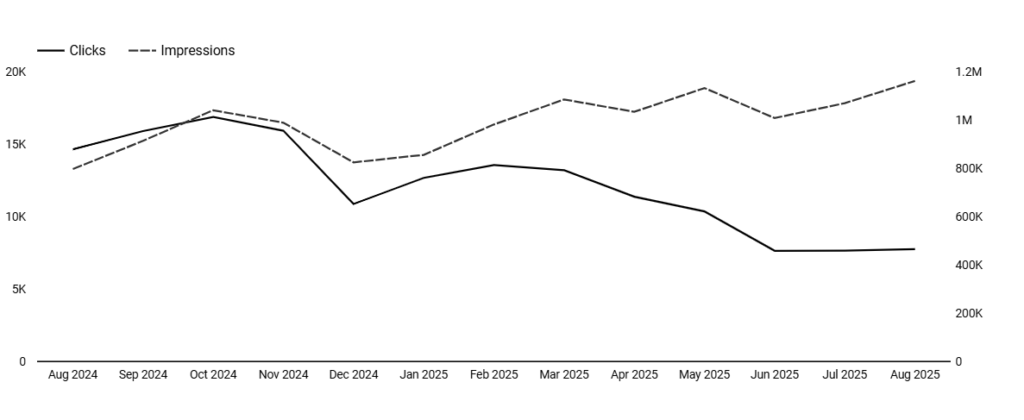Website Clicks Drop as AI Overviews Increase Impressions
If you’re seeing an unusual trend in your Google Search Console, with rising impressions but dropping clicks, you’re not alone. This isn’t a bug or poor SEO. This is the result of a major shift in how search engines deliver results: the rise of AI Overviews.
Why Impressions Are Going Up While Clicks Are Going Down
Here’s what’s happening: Your website is appearing more frequently in the AI overviews of the Google search results, but users are clicking through to your website less.
Your content is showing up more frequently.
AI Overviews often cite the sources used to generate the reply. If your content already ranks well in a traditional Google search, and it appears in an AI overview, it may now be getting counted twice; once in the traditional results, and once (or more) in the AI Overview.
But users don’t need to click.
Since the AI-generated summary often resolves the searcher’s question directly, there’s less incentive to visit your website. So, although you may have more overall website impressions on Google, your organic website traffic is likely declining.
Backed by the Data
Ahrefs analyzed over 300,000 keywords and found that when an AI Overview appears, clickthrough rates (CTR) drop by 35%. In other words, your brand may still be visible, but not in a way that drives website traffic like it used to.
This shift has been called “The Great Decoupling,” a term coined by Darwin Santos and picked up across the SEO community, referring to the widening gap between impressions and clicks. In previous years, the two metrics were closely aligned. Now, they often move in opposite directions.
How to Spot This Trend in Your Own Data

This graph shows a common pattern many site owners are noticing in Google Search Console: impressions trending upward while clicks remain flat or decline. This visual helps illustrate what “The Great Decoupling” looks like in practice and can serve as a reference point when reviewing your own data.
Do you want to confirm this is happening to you? Look for:
- High-ranking keywords with increasing impressions
- Corresponding drop in clicks or flat click trends
- Appearance of AI Overviews for those same keywords
If you use Ahrefs, try filtering keywords that trigger AI Overviews where your site ranks in positions 1–10. You may find that many are earning impressions from both organic results and the AI summary without double the clicks.
What This Means for Your Content and SEO Strategy
This shift requires rethinking how you measure success and structure your content. Here are some ideas for how to adjust your focus:
Reframe your KPIs
Success in search is no longer just about traffic. Visibility in AI summaries can drive brand awareness and trust, even without clicks. Include a search visibility metric in your core reporting KPIs.
Prioritize high-value content
Content that is clear, structured, and directly answers user questions is more likely to be pulled into AI Overviews.
Optimize for visibility, not just rankings
Your content needs to be easy for AI to parse. This means using well-organized headers, concise summaries, and schema markup where applicable.
Track AI-influenced performance
Don’t just monitor organic rankings. Track branded mentions, AI citations, and brand lift.
Why Lower Clickthrough Rates from AI Overviews Aren’t Always Bad for SEO
While it’s easy to panic over dropping clicks, there’s also a silver lining. According to Ahrefs’ Patrick Stox, visits that do come from AI-powered results often convert up to 23x better than traditional search traffic.
That’s because users clicking through from an AI Overview already trust your brand and are further along in their decision-making process.
The Future of SEO Lies in Smarter Content Not Higher Clicks
Yes, search patterns are changing. But this isn’t the end of SEO; it’s the end of shortcut-driven SEO that lacks strategy and substance. To be effective in this new era of generative search, content needs to build trust, provide real answers, and show up in the conversations AI is curating.
Ready to Rethink Your SEO Strategy?
At Foundery, we help businesses stay ahead of the curve with Generative Engine Optimization (GEO) approaches ready for the AI era. By blending human insight with smart AI-driven technology, we make sure your brand is not only seen, but trusted, cited, and converting, across both traditional search and emerging AI-generated experiences.
Want to improve your strategy for search beyond clicks?



